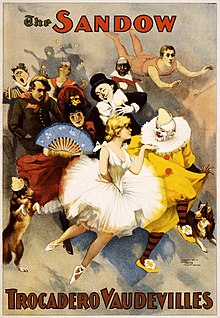
Back فودفيل Arabic Vodevil AST Vodevil Azerbaijani Водевиль Bashkir Водевил Bulgarian Vodevil Catalan ڤۆدڤیل CKB Vaudeville Czech Vaudeville Welsh Vaudeville Danish
This article includes a list of general references, but it lacks sufficient corresponding inline citations. (November 2022) |

Vaudeville (/ˈvɔːd(ə)vɪl, ˈvoʊ-/;[1] French: [vodvil] ⓘ) is a theatrical genre of variety entertainment which began in France at the end of the 19th century.[2] A Vaudeville was originally a comedy without psychological or moral intentions, based on a comical situation: a dramatic composition or light poetry, interspersed with songs and dances.[3] It became popular in the United States and Canada from the early 1880s until the early 1930s, while changing over time.[4]
In some ways analogous to music hall from Victorian Britain,[5] a typical North American vaudeville performance was made up of a series of separate, unrelated acts grouped together on a common bill. Types of acts have included popular and classical musicians, singers, dancers, comedians, trained animals, magicians, ventriloquists, strongmen, female and male impersonators, acrobats, clowns, illustrated songs, jugglers, one-act plays or scenes from plays, athletes, lecturing celebrities, minstrels, and films. A vaudeville performer is often referred to as a "vaudevillian".
Vaudeville developed from many sources, including the concert saloon, minstrelsy, freak shows, dime museums, and literary American burlesque. Called "the heart of American show business", Vaudeville was one of the most popular types of entertainment in North America for several decades.[6]
- ^ "vaudeville". Merriam-Webster.com Dictionary. Merriam-Webster.
- ^ Terni, Jennifer L. (2006). "A Genre for Early Mass Culture: French Vaudeville and the City, 1830-1848". Theatre Journal. 58 (2): 221–248. ISSN 1086-332X.
- ^ "Vaudeville | Definition, History, & Facts | Britannica". www.britannica.com. 23 November 2024. Retrieved 14 December 2024.
- ^ "Vaudeville | Definition, History, & Facts | Britannica". www.britannica.com. 23 November 2024. Retrieved 14 December 2024.
- ^ "Forms of Variety Theater". Library of Congress. 1996. Retrieved 27 April 2018.
- ^ Trav, S.D. (31 October 2006). No Applause-Just Throw Money: The Book That Made Vaudeville Famous. Faber & Faber. ISBN 978-0-86547-958-6.